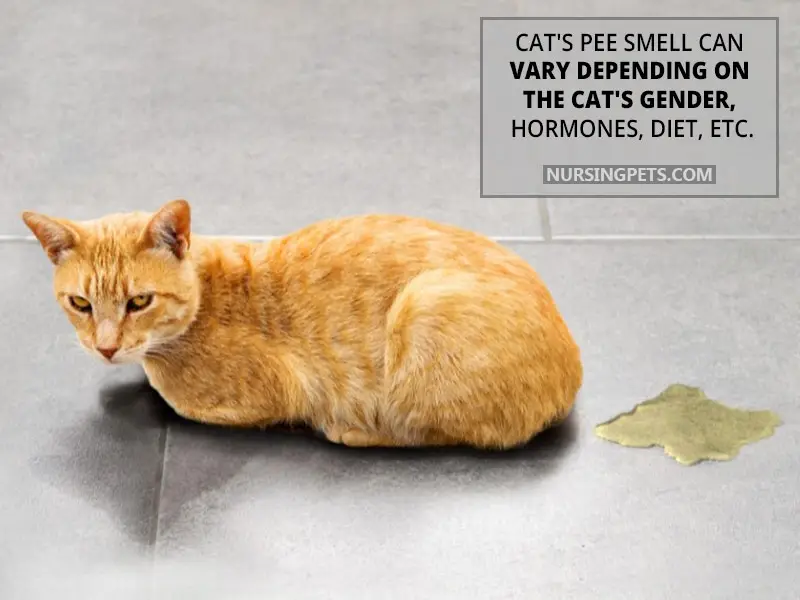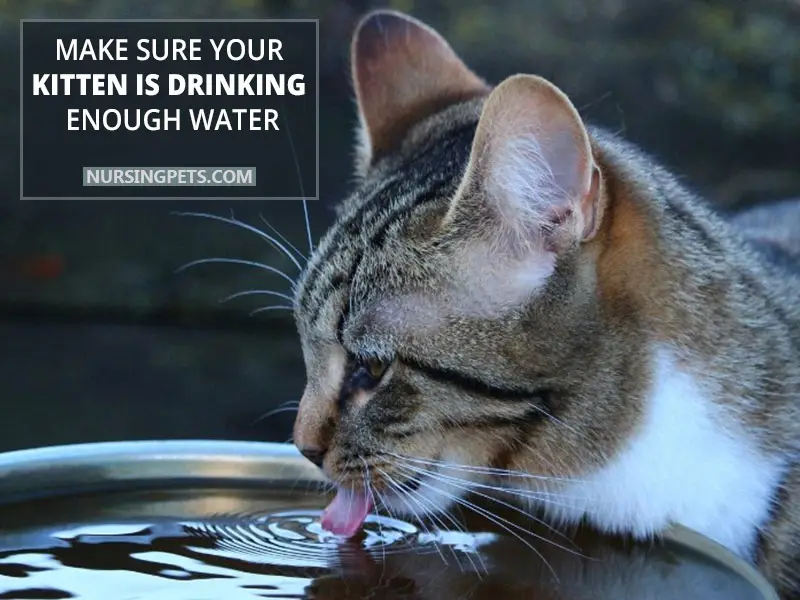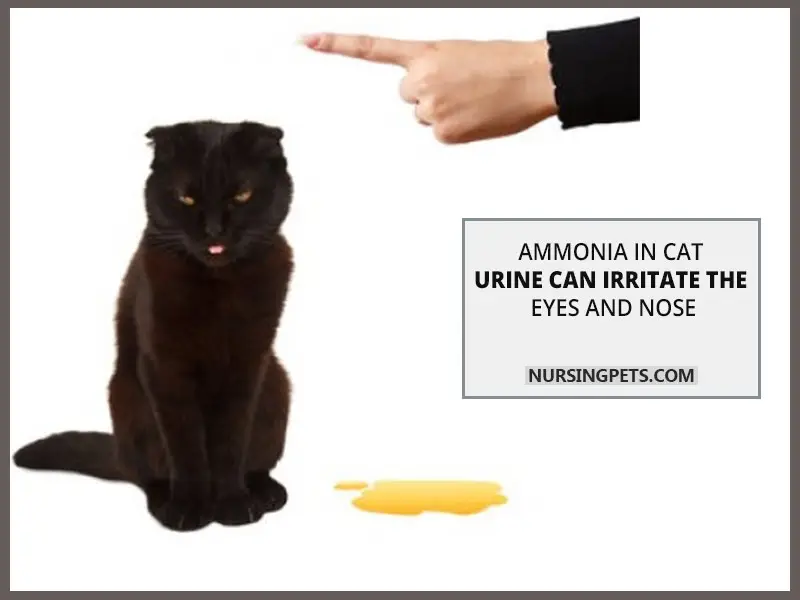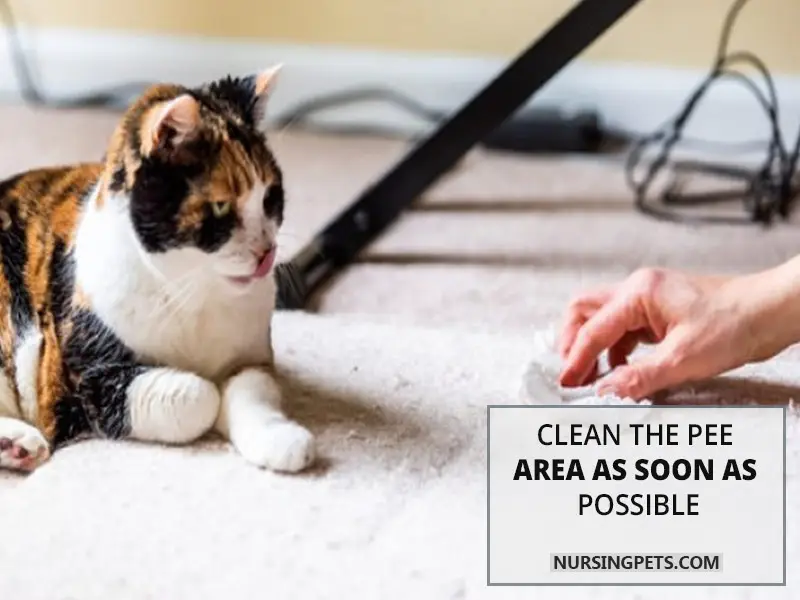What Does Cat Pee Smell Like?
Cats are popular pets. Their owners adore them for their playful and loving nature. However, one of the downsides of having a cat is dealing with its pee smell. The odor of cat urine can be unpleasant and overwhelming.
But exactly what does cat pee smell like? Usually, cat pee smells like ammonia. The strong, pungent odor can feel like a burning sensation in your nose. Also, cat pee can smell like burnt rubber or plastic when cats mark their territory or are in heat.
This is because cat urine contains ammonia and 2% urea, which naturally decomposes to cyanate. The smell can get stronger over time as more decomposition occurs and releases sulfur compounds. However, the smell can vary depending on the cat’s gender, hormones, reproductive activity, and age of the cat, as well as their diet and health.
Looking for more information about cats:
Identify The Smell of Cat Urine
Nobody likes to be around the smell of cat urine. Unfortunately, cats can’t always make it to the litter box, so it’s important to know how to identify the smell of cat urine. Here’s a step-by-step guide to help you recognize the smell of cat urine.

Sniff It Out
Sometimes, finding where your cat peed is as easy as using your sense of smell. If you can still smell cat urine after cleaning the litter box, it’s likely your cat peed somewhere else.
Try to identify the room the smell is coming from and check in the most likely places first. Planters are a favorite because of the soil.
Use a Black Light
A black light can help identify where your cat has peed, even though you can’t see the stain. Turn off the lights and shine the black light over carpets, furniture, and other areas where your cat may have urinated. The urine stains will glow under the black light.
Look for Discoloration
Cat urine can leave discoloration on surfaces, so look for any discolored areas with a different texture than the surrounding area.
Check Corners and Edges
Cats often pee in the corners and edges of rooms, so check these areas thoroughly.

Follow Your Cat
If you suspect your cat is peeing outside of the litter box, try to keep an eye on them and follow them around the house. You may be able to catch them in the act or see where they’re going after they use the litter box.
By following these steps, you should be able to identify the source of the cat urine smell in your home. Once you’ve identified the location, you can move on to effectively cleaning and removing the odor.
8 Different Types of Cat Urine Smells and Their Causes
The fact is, cats’ urine has a variety of smells, depending on the cat and what may be causing the scent. Here are a few of the most common types of cat urine smells and what they can tell you about your cat’s health and behavior:
01. Ammonia – This is caused by the decomposition of urea and nitrogen compounds by bacteria. Also, it is one of the most common cat urine smells and is often a sign of a urinary tract infection (UTI).
Moreover, it is the most pungent of cat urine smells and can be unpleasant for humans.

02. Fishy – This is not a typical cat urine smell and could indicate a problem with your cat’s kidneys or liver. A urinary tract infection or a fish-based diet could also cause it.
03. Sweet – This is also not a common cat urine smell and could indicate a serious condition like diabetes or ketoacidosis. It could also be caused by some medications or supplements
04. Acidic – In case your cat’s urine has an acidic smell, this is not a specific cat urine smell and could vary depending on the pH of your cat’s urine.
A normal pH range for cat urine is 6.0 to 6.5. A lower pH could indicate a urinary tract infection or bladder stones, while a higher pH could indicate a urinary tract infection or crystals
05. Musty – Musty cat urine smells are usually caused by bacteria that are living in your cat’s bladder. This type of smell can also indicate that your cat has a urinary tract infection or bladder stones.
06. Burnt Rubber or Plastic Smell – This is caused by the presence of pheromones that cats use to mark their territory or signal their reproductive status. However, the smell can vary depending on the cat’s gender, hormones, diet, and activity.

07. Sulfur-Like Smell – This is caused by the breakdown of sulfur compounds in cat urine. Sulfur compounds are essential for cell growth, wound healing, and hydration in cats. The smell can be stronger in older cats or cats with health issues.
08. Food or Medication Smell – This is caused by the influence of the cat’s diet or medication on the urine composition. Some foods or drugs can alter the pH, color, or odor of cat urine.
Remember, knowing what each type of cat urine smells means can help you figure out what’s wrong with your cat and get them the help they need.
A reliable way to determine the type and cause of your cat’s urine smell is to have your cat checked by a veterinarian. They can perform tests on your cat’s urine and blood to diagnose any underlying health issues or infections.
Moreover, they can also advise you on the best diet and medication for your cat to prevent or treat any urinary problems.
Is The Smell Of Cat Pee Strong?
The smell of cat pee can be quite strong. It is usually caused by the presence of ammonia, which is a strong-smelling gas released when urine breaks down. The smell of cat pee can be hard to ignore and can linger for days or weeks.

Why Does Cat Urine Smell So Strong? Cat urine contains a high concentration of urea, a nitrogenous compound that tends to produce an ammonia-like odor when it decomposes. This smell can become stronger if the cat is dehydrated.
Likewise, the chemical composition of cat urine includes uric acid and other compounds that contribute to its distinctive smell.
Furthermore, bacterial decomposition of urea in old or stale urine produces mercaptans, which also contribute to the strong odor of cat urine. This is why the smell of cat urine can linger for a long time, and it can be difficult to get rid of the odor completely.
Other than those, some possible reasons why your cat’s pee smells stronger than normal are:
Dehydration: If your cat does not drink enough water, their pee becomes more concentrated and has a stronger ammonia smell.
Diet: When your cat eats a lot of protein, especially chicken-based protein, their pee produces more urea and has a stronger ammonia smell.
Stress: A stressed or anxious cat may spray urine to mark their territory or express their emotions. And cat spray has a stronger smell than normal urine and can linger for a long time.
Urinary tract infection: Bacterial infection in a cat’s urinary tract can cause pee to smell stronger and may also contain blood or pus. This can be a serious condition that requires veterinary attention.
Male Vs. Female Cat Urine Smell
Interestingly, male and female cats can have different urine smells due to various factors such as hormones, age, breed, health, and diet.
Why Does My Male Cat’s Pee Smell Strong?
Male cats tend to produce stronger and more pungent urine than females because of the presence of testosterone and pheromones. Testosterone signals other males to stay away and lets females know a male is nearby.

Male cat urine also contains felinine, an amino acid that contributes to the odor. Moreover, older cats, cats with compromised kidneys, and those with urinary tract issues may have extra foul-smelling urine.
What Does Female Cat Pee Smell Like?
Female cats’ urine smell is not as strong as males’ since they have lower testosterone levels. However, intact female cats in heat may spray urine to attract males. On top of that, Female cats with urinary problems may have stronger and different-smelling urine.
Overall, normal cat urine for an adult, spayed, or neutered cat will have a slightly pungent, acidic scent that is fairly inoffensive and generally weak. However, a sudden change in the smell of your cat’s urine could be a sign of a urinary issue.
Kitten Pee Smell Like Ammonia
The strong smell of ammonia coming from your kitten’s urine is most likely due to an increase in the number of waste products in their urine. This usually occurs when your kitten is not drinking enough water, which can cause a buildup of toxins in their urine.

Moreover, certain cat litter can also contribute to the smell of ammonia, as some litters break down into ammonia when they come into contact with the cat’s urine. To reduce the smell of ammonia, make sure your kitten is drinking plenty of water and switch to a litter that is free of ammonia.
Does All Cat Pee Smell The Same?
Not all cat urine smells the same. The smell of a cat’s urine can vary depending on the cat’s diet, health, and age. For example, a cat with a diet that is high in protein will produce a stronger and more pungent smell.
An older cat’s urine may also have a stronger smell due to age-related conditions such as kidney failure or urinary tract infections. On the other hand, cats with medical conditions such as diabetes or urinary tract infections may have a much more pungent urine smell than cats without such conditions.
The Health Risks of Cat Urine Smells
Breathing in cat pee smell for an extended period can lead to health problems, particularly for people who have respiratory issues. The smell of cat urine can trigger bronchitis and asthma.
We already mentioned that cat urine contains urea, creatine, uric acid, and other electrolytes that give it a distinct odor and a yellow color. If the smell of cat urine is neglected, the odor-causing germs can proliferate, leading to a more pungent smell and increased health risks.

Furthermore, ammonia in cat urine can irritate the eyes, nose, and throat, causing headaches and even ammonia poisoning. Ammonia is also one of the primary culprits for the nasty smell of cat urine. It can pose other health risks as well.
Symptoms of cat urine allergy can mostly resemble those of fur allergy and can include headaches, wheezing, coughing, breaking out in hives or rashes, irritated, teary eyes, and sneezing from an itchy, runny nose.
Individuals with respiratory conditions should take particular care to avoid inhaling ammonia from cat urine, and any lingering smell of cat urine should be removed to prevent further health risks.
The Impact of Cat Urine Smell on Your Pet
Cat urine smell can have a significant impact on pets. It can cause stress and anxiety in dogs, cats, and other animals, making them less comfortable in their environment. The strong scent of cat urine can cause dogs to become agitated, leading to destructive behavior such as chewing or digging.
Cats may also develop inappropriate elimination habits if they smell cat urine in areas where they are not supposed to urinate, leading to issues with litter box training.
How/Ways To Prevent Or Reduce The Strong Smell Of Cat Pee
There are some effective ways to prevent or reduce the strong smell of cat pee, such as:

1. Clean up the urine as soon as possible with paper towels or a cloth to absorb and remove as much of the urine as possible.
2. Rinse the area with cold water and mild detergent, and then use a wet/dry vacuum to remove the liquid.
3. Applying an enzymatic cleaner can break down the urine molecules and neutralize the odor. You can find these products at pet stores or online.
4. Using natural remedies like baking soda, vinegar, hydrogen peroxide, or club soda to deodorize and disinfect the area. However, these may not be as effective as enzymatic cleaners and may damage some fabrics or surfaces.
5. Avoid ammonia-based cleaners, as they can worsen the smell and attract your cat to pee in the same spot again.
6. Providing fresh water for your cat and encouraging them to drink more can dilute their urine and make it less smelly.
7. Varying your cat’s diet and including different protein sources can affect the smell of their urine.
8. Identifying and eliminating your cat’s stress sources can help stop spraying urine or peeing outside the litter box.
9. Keeping the litter box clean and using odor-neutralizing products can prevent your cat from avoiding the litter box and peeing elsewhere.
10. Have your cat checked by a veterinarian if you suspect a urinary tract infection or other health issues, as this can cause strong-smelling urine and require treatment.
How Do I Get Rid of Cat Urine Smell Completely?
When you’re struggling with the persistent odor of cat urine, don’t worry – there are ways to get rid of it for good. Follow these step-by-step guidelines to eliminate cat urine smell forever:

01. Locate the stain: Find the urine stain as soon as possible and blot up as much of the urine as you can with a clean cloth.
02. Rinse and Vacuum: Next, rinse the area with clean water and remove the liquid with a wet/dry vacuum. Avoid using a steam cleaner, as the heat can set the stain.
Check out this product; if you’re looking for a great vacuum cleaner (the link will take you to Amazon).
03. Soak and Apply Cleaning Solution: Apply a cleaning solution made of equal parts white vinegar and water to the affected area. Soak the area thoroughly and let it sit until dry.
You can also use a bristle brush to rub the vinegar/water mixture until the area is completely soaked, and the vinegar neutralizes the ammonia smell in your cat’s urine.
04. Apply Baking Soda: After the area has dried, cover the stain with baking soda. It will work with vinegar to absorb and neutralize odor.
If you’re looking for a good baking soda, check out this product from Amazon.
Vacuum or Brush: Once the baking soda has had time to absorb the odor, vacuum or brush away any powdery residue.
Repeat process: If the odor persists, repeat steps 3-5 until the smell is gone.
Additional Tips:
- Use cold water when cleaning up urine, as heat can make the stain and odor more difficult to remove.
- To get a better result, you can also use enzyme cleaner for cat urine.
- Avoid ammonia-based cleaners, as they can make the smell worse.
- If cleaning clothes, presoak the fabric in white vinegar or use a store-bought presoaking solution before washing.
For white vinegar, check this product from the Amazon.
- Always test fabric for colorfastness before using any cleaning product.
- For particularly strong smells, you may want to use pure vinegar instead of combining it with water.
- For an alternative solution, soak the clothing with water and a cup of baking soda or a bit of apple cider vinegar before washing.
- Use a spray bottle to apply the vinegar cleaning solution to furniture or flooring.
- For ongoing odor control, consider using a litter box with activated carbon filters to help absorb and neutralize odor.
Remember, treating the cat’s urine stains is crucial as soon as possible. The longer the stain sits, the harder it will be to eliminate the odor for good. By following these guidelines, you can get rid of the cat urine smell forever and keep your home smelling fresh and clean.
Frequently Asked Questions
01. Does Cat Urine Smell Sweet?
Cat urine can sometimes smell sweet. This could be due to the presence of excess sugar in the urine, which is a strong indicator of diabetes. However, sweet-smelling urine could also be caused by dehydration or a urinary tract infection.
02. Does Cat Pee Smell Like Human Pee?
Cat urine and human urine have some similarities in their chemical composition, but significant differences affect their odor and appearance. Cat pee has a much stronger ammonia-like odor than human pee, so it is often hard to clean up.
3. What Smells Stronger, Cat Pee Or Dog Pee?
Cat pee generally smells stronger than dog pee due to the high concentration of uric acid in cat urine. However, the smell of pet urine can also vary based on factors such as diet, hydration, and health issues.
Final Thought
Cat pee can be a very unpleasant smell depending on the source. It is caused by a combination of various chemical compounds which give off a strong and distinct odor that is difficult to ignore. Therefore, it is important to take steps to prevent and clean up any accidents as soon as possible to minimize the smell.
Article References:
- https://www.catster.com/lifestyle/what-could-cause-my-cats-urine-to-smell-strong
- https://www.mcgill.ca/oss/article/you-asked/why-does-cat-urine-smell-so-bad-and-what-can-i-do-about-it
- https://cat-world.com/cat-urine/
- https://www.usatoday.com/story/news/2022/07/28/cat-urine-odor-removal-tips/10157434002/
- https://www.familyhandyman.com/article/ways-to-get-rid-of-cat-smell/
Image Credits:
- Canva.com/photos
- Stock.adobe

